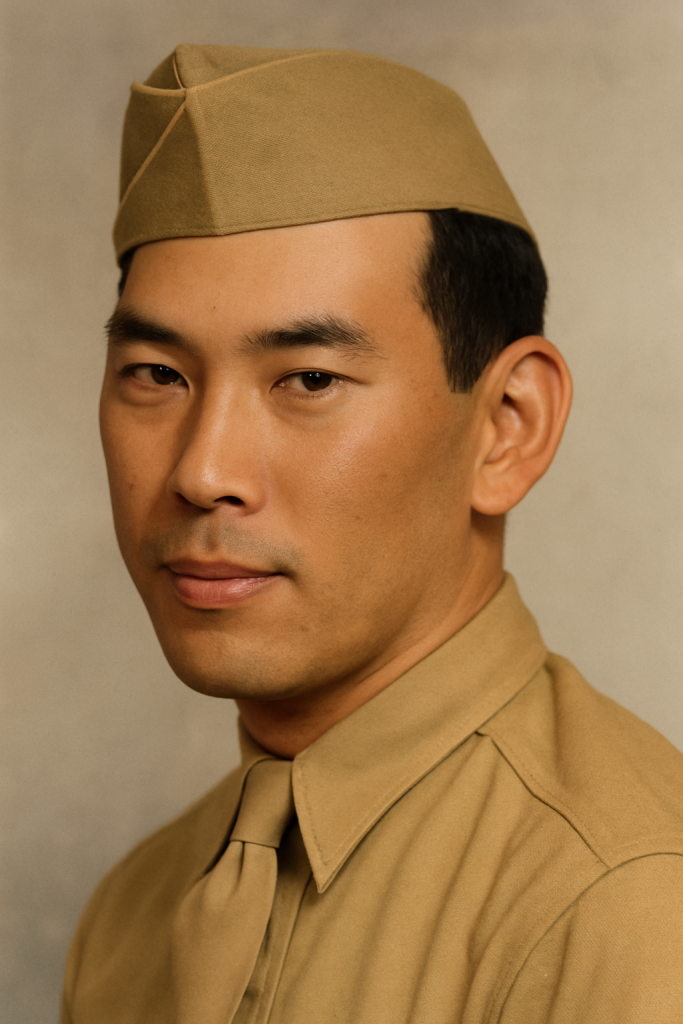Robert T. Kuroda: The Warrior of the Vosges
In the dark forests of the Vosges, Sergeant Robert T. Kuroda charged through a storm of bullets, silencing enemy guns with grenades, rifle fire, and sheer resolve. Though a sniper’s bullet cut him down at 21.
September 25, 2025

 Robert T. Kuroda: The Warrior of the Vosges
Robert T. Kuroda: The Warrior of the Vosges
In the quiet sugar town of Aiea, Hawaii, Robert Toshio Kuroda was born on November 8, 1922. The son of Japanese immigrants, he grew up like many Nisei boys—straddling two worlds. At home, his parents instilled in him humility, respect, and perseverance. At school, he trained as an electrician, his steady hands building a future that seemed secure. But the world was shifting, and war would soon redirect his path forever.
When Japan attacked Pearl Harbor in 1941, suspicion fell like a shadow over Japanese Americans. They were branded “enemy aliens,” their loyalty doubted, their rights stripped away. Yet Robert Kuroda never wavered. America was his only home, and he was determined to prove his devotion. In March 1943, he volunteered for the newly formed 442nd Regimental Combat Team—an all-Nisei unit whose members pledged to Go for Broke, risking everything for victory.
The 442nd would carve its name into history as one of the most decorated units of World War II. But their honors were earned in the crucible of some of the fiercest fighting of the war. By the fall of 1944, they were thrown into the dense, rain-soaked forests of the Vosges Mountains in France. The terrain was brutal, the weather unrelenting, and the German defenses nearly impenetrable. Exhaustion, hunger, and the weight of representing an entire generation pressed heavily on their shoulders. Still, they fought on.
On October 20, 1944, Sergeant Robert Kuroda’s platoon was pinned down by deadly German machine-gun fire. Bullets shredded the forest around them, and movement seemed impossible. In that moment of crisis, Kuroda rose. With grenades in hand, he charged the first enemy nest, killing the gunners and shattering the chokehold on his men. Switching to his rifle, he pressed forward, cutting down enemy soldiers with unerring precision until every round was gone.
But his courage did not falter. Spotting a fallen officer nearby, Kuroda dashed through the storm of fire, seized the man’s submachine gun, and turned it against the enemy. Alone, he stormed a second machine-gun position, annihilating its crew and scattering the survivors. His one-man assault opened the path for his platoon, inspiring them to press forward.
And then—just as triumph seemed within reach—a sniper’s bullet struck. At only 21 years old, Robert T. Kuroda fell in the Vosges forest, giving his last full measure of devotion far from his Hawaiian home. His brothers-in-arms carried on, but the memory of his sacrifice stayed with them forever.
For his extraordinary valor, Kuroda was posthumously awarded the Distinguished Service Cross. Yet the full weight of his heroism went unrecognized for decades, obscured by prejudice against Japanese American soldiers. It was not until 2000, after a national review of military records, that his award was rightfully upgraded to the Medal of Honor. At the White House, President Bill Clinton presented it to his family, declaring his valor equal to any in American history.
Today, Robert T. Kuroda rests in the National Memorial Cemetery of the Pacific—the Punchbowl—in Honolulu. His legacy endures not only in stone but in steel: the Army named a logistics support vessel, the USAV SSGT Robert T. Kuroda (LSV-7), in his honor. In 2021, nearly 80 years after his death, his Farrington High School class ring was discovered in the soil of France where he fell and returned to his family—a powerful reminder that his story, though cut short, lives on.
Robert Kuroda’s legacy is more than a tale of battlefield valor. It is the story of a young man who fought for a nation that doubted him, a soldier whose courage broke through walls of prejudice as surely as it shattered enemy defenses. In the dripping forests of the Vosges, he gave his last full measure of devotion—not for glory, not for recognition, but so that his brothers-in-arms might live. His name shines today as a beacon of loyalty, sacrifice, and the unyielding faith of the Nisei generation.

